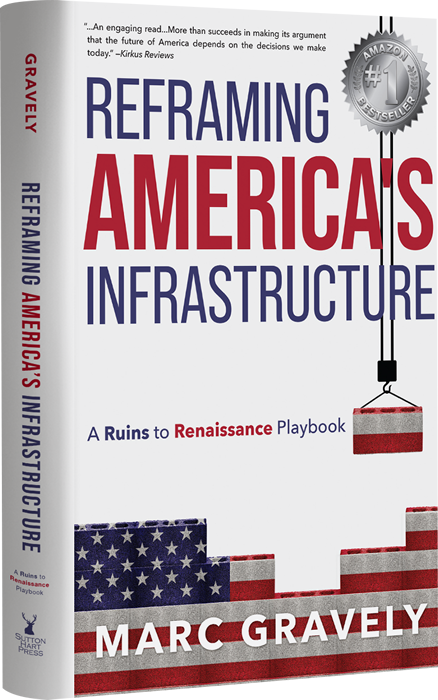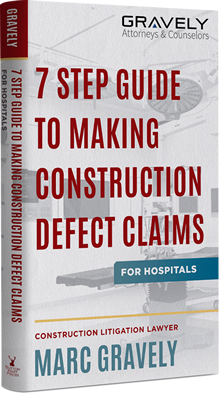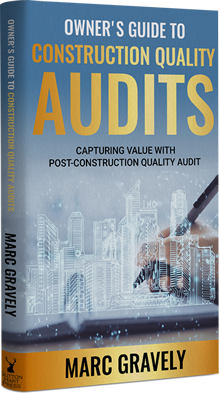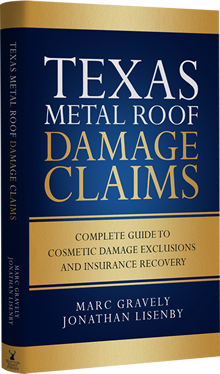MARC GRAVELY'S BOOKS
Marc Gravely, a Texas-based construction mega-lawyer and writer, has authored multiple books including a legal series addressing construction defects and illegally reluctant insurers. In Marc’s newest book Reframing America’s Infrastructure: A Ruins to Renaissance Playbook, Sutton Hart Press, he takes on a big and broad topic: United States infrastructure – from highways, ports, and schools to electrical grids, cybersecurity, and environmentally focused design.
Author Gravely, following the success of his earlier volumes, is uniquely suited to report on the massive topic of infrastructure as he has the academic background and practical experience with construction/engineering/design on major projects, collateral policy, and governmental trade advocacy, and he has a deep interest in America’s future.
 Sutton Hart Press
Sutton Hart PressReframing America’s Infrastructure
A Ruins to Renaissance Playbook
At a 30,000 foot level, Reframing America’s Infrastructure is a captivating dive into our potential as a nation and author Gravely illustrates the inspiring power of innovation and the chilling risks of inaction.
Praise for Reframing America’s Infrastructure
-
An Engaging Read To Be SureKirkus Reviews
-
Gravely Is A VisionaryNorm Pattis, Bestselling Author Taking Back the Courts
-
A Fascinating Exercise In Informed FuturismMedium
EXCERPT
“America will hit its 250th year mark in 2026, reaching what some scholars list as the average lifespan of leading civilizations throughout history. A look into trends preceding the passing of the torch reveals the staggering impact infrastructure has on the success and demise of nations.
Robust investments in infrastructure foreshadow a powerful economy, national security, and world leadership. Post WWII expansion took America to the top in business, employment, mobility, opportunities, and ideas. Solid structures, reliable transport, and efficient use of resources bolster the American machine.
Beyond our position as a nation – and just as important – American infrastructure connects our people and businesses. We rely on it for safety, productivity, social interaction, education, and entertainment. Infrastructure is community. It’s how we experience life. Infrastructure defines us from the Hoover Dam to the Golden Gate Bridge, the Empire State Building, and the Erie Canal.
Aside from community, investment in infrastructure is an intergenerational duty. Past generations build the foundations for the nation we enjoy today. We strive to do the same.
However, we get comfortable. Decades of affluence and exciting technological shifts detracted from maintenance and investment in even the basics. A quick-fix, patchwork approach replaced thoughtful planning and financing. Now, capacity is failing to meet demands. Life expectancies of the very systems that allow us to operate are running out, and investment is scant.
American bridges, dams, and waterway locks are deteriorating from erosion, overload, geotechnical changes, and extreme weather. We drive roads of disintegrating concrete and supply water from decayed pipes and wells, threatening safety and accelerating erosion.
Overwhelmed drains and wastewater systems are clogging and flooding. Freezing temperatures and extreme heat are stressing power distribution lines to breaking point, power outages are becoming a common and dangerous occurrence. Outdated port facilities and shallow, narrow harbors are causing costly delays affecting trade and stunting manufacturing, agriculture, and extraction – all vital economic drivers.
Space systems are becoming critical infrastructure. We rely on thousands of high-functioning space stations and satellites for communications, navigation, information processing and national security. Yet we still struggle to coordinate the resources, programs, and security standards supporting this infrastructure.
Developments in green infrastructure like wetlands, green roofs, permeable pavements, and rain gardens promise to restore many of the natural mechanics necessary to sound water management and durable urban environments…” End Excerpt
“We are mere custodians of our planet – just passing through. Perspective is fundamental as we define priorities and develop plans, strengthening the U.S. economy and our quality of life moving forward. We can leave it better than we found it.”






